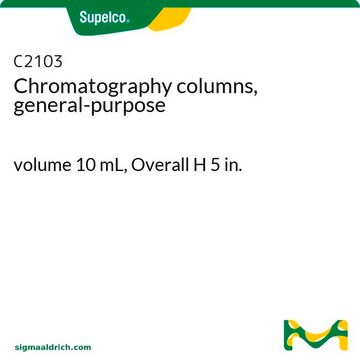C3669
Liquid chromatography columns
Luer Lock, Non-jacketed, bed volume 4 mL, I.D. × L 0.7 cm × 10 cm
Sign Into View Organizational & Contract Pricing
All Photos(2)
About This Item
UNSPSC Code:
12000000
eCl@ss:
32060201
NACRES:
SB.52
Recommended Products
grade
for chromatography
technique(s)
LPLC: suitable
I.D. × L
0.7 cm × 10 cm
bed volume
4 mL
Looking for similar products? Visit Product Comparison Guide
Related Categories
General description
All of the columns listed below are constructed of borosilicate glass and are rated at a maximum pressure of 15psi (1 bar). Five configurations are available:
A - Luer-Lock, Non Jacketed: Fixed polypropylene end caps, polyethylene bed supports, Luer-Lock inlet and outlet fittings.
B - Luer-Lock, Jacketed: Same as A (above), with a borosilicate glass jacket surrounding the column body for temperature control.
C - Open-ended: Fixed polypropylene ends (outside of tube only), without jacket or end fittings. Requires 2 flow adapters.
D - PTFE, non-jacketed: Threaded ends, removable PTFE fittings with shielded O-ring seals, 20 μm polyethylene bed supports, and 1/4-28 threaded tubing connections. Solvents contact only PTFE and borosilicate glass.
E - PTFE, jacketed: Same as D (above), with an acrylic jacket surrounding the column body for temperature control.
A - Luer-Lock, Non Jacketed: Fixed polypropylene end caps, polyethylene bed supports, Luer-Lock inlet and outlet fittings.
B - Luer-Lock, Jacketed: Same as A (above), with a borosilicate glass jacket surrounding the column body for temperature control.
C - Open-ended: Fixed polypropylene ends (outside of tube only), without jacket or end fittings. Requires 2 flow adapters.
D - PTFE, non-jacketed: Threaded ends, removable PTFE fittings with shielded O-ring seals, 20 μm polyethylene bed supports, and 1/4-28 threaded tubing connections. Solvents contact only PTFE and borosilicate glass.
E - PTFE, jacketed: Same as D (above), with an acrylic jacket surrounding the column body for temperature control.
Certificates of Analysis (COA)
Search for Certificates of Analysis (COA) by entering the products Lot/Batch Number. Lot and Batch Numbers can be found on a product’s label following the words ‘Lot’ or ‘Batch’.
Already Own This Product?
Find documentation for the products that you have recently purchased in the Document Library.
K Kamino et al.
Science advances, 6(46) (2020-11-15)
In the face of uncertainty, cell populations tend to diversify to enhance survival and growth. Previous studies established that cells can optimize such bet hedging upon environmental change by modulating gene expression to adapt both the average and diversity of
Peter Morris et al.
Journal of bacteriology, 190(6), 2172-2182 (2008-01-08)
A characteristic feature of bacteriophage genomes is that they are architecturally mosaic, with each individual genome representing a unique assemblage of individual exchangeable modules. Plausible mechanisms for generating mosaicism include homologous recombination at shared boundary sequences of module junctions, illegitimate
Our team of scientists has experience in all areas of research including Life Science, Material Science, Chemical Synthesis, Chromatography, Analytical and many others.
Contact Technical Service




